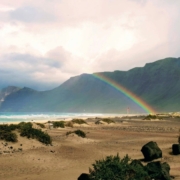The summer’s weather so far has been a fascinating mix of good, bad and a little bit of ugly, but Lanzarote has still been a welcome refuge compared to many places.
Delivering Gazette Life magazine to Haría last month we were surprised to experience rain on the windscreen and cool weather of 17 degrees Celsius. These are conditions that residents in the high-lying northern town are used to in winter – but in July they come as a real surprise.
It’s extremely rare to see any rain at all in Lanzarote’s intense summer, but plenty of tourists were disappointed to wake up to grey skies and even the odd spatter of rain in early July. Some even saw a rainbow – common in April but barely ever seen in July. Temperatures were fairly normal but only started to get above 30 degrees in the second half of July.
What made things especially notable was the contrast with the rest of Europe When the UK suffers a heatwave you may often see headlines claiming that Birmingham or Belfast is “hotter than Lanzarote.” However, in early July almost everywhere in Europe could have made that claim.
Fierce heatwaves affected Spain, France and Italy; England experienced the hottest June since records began, and heatwaves continued into July with temperatures in the UK frequently reaching the mid-30s.
Meanwhile, on Lanzarote, the temperature was comparatively temperate, rarely breaking the 30-degree barrier. A short heatwave at the end of June caused by a band of air from Africa led to high temperatures, and this time Haría held the record as Lanzarote’s warmest town.
Other parts of the island have experienced a short but surprisingly heavy calima, and the island has also seen some strong winds, with gusts of up to 70 kph. However, July and August are the windiest months on Lanzarote and this is nothing extraordinary.
The overall pattern for the island is likely to remain normal for summer – cloud cover in the mornings that will burn off later in the day, plenty of glorious sunshine and brisk northern breezes that prevent the heat from ever becoming too unbearable.
THE DONKEY’S BELLY
This year we’ve seen plenty of the Canarian weather phenomenon known as panza de burro (donkey’s belly).
This is a name for fluffy, light grey cloud cover in the morning that burns off later in the day. It got its name in Las Palmas de Gran Canaria, where these conditions are common and is often welcomed by those who have to work outdoors.
Prevailing north-eastern alisio winds mean the donkey’s belly is mainly seen on northern coasts, but on Lanzarote, where there aren’t any really high mountains to stop it, it can often spill over to the south coast.











Leave a Reply
Want to join the discussion?Feel free to contribute!